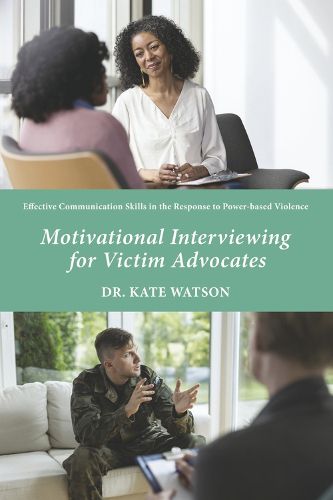Readings Newsletter
Become a Readings Member to make your shopping experience even easier.
Sign in or sign up for free!
You’re not far away from qualifying for FREE standard shipping within Australia
You’ve qualified for FREE standard shipping within Australia
The cart is loading…






Power-based violence- the kind of harm that is inflicted upon individuals or groups due to power imbalances- targets marginalized communities and violates their rights to human dignity. Addressing power-based violence requires challenging power structures, promoting equality, and fostering inclusive and respectful environments for all.
Victim advocacy refers to the support provided to individuals who have experienced some form of power-based violence: domestic violence, sexual assault, child abuse, human trafficking, and coercive control. Advocates help victims navigate the legal, medical, and social systems, provide crisis intervention, facilitate safety planning, and provide court accompaniment when necessary. The primary goal of victim advocacy is to empower victims and help them regain control over their lives in the aftermath of violence or oppression. To put it simply, advocates help people move forward to a brighter, safer, and freer future, even when something terrible has happened in the past.
This book shares best practices in motivational interviewing (MI) for victim advocates. Developed in the early 1980s by psychologists William R. Miller and Stephen Rollnick, motivational interviewing was originally designed as a way to have collaborative conversations with people about their alcohol consumption. Over time, Miller and Rollnick have illustrated the utility of MI across many new and emerging areas: healthcare, leadership and management, fitness, education, athletic training, and more. As always, Miller and Rollnick remain the authority on the development of MI, and this book provides applications to the field of victim advocacy.
$9.00 standard shipping within Australia
FREE standard shipping within Australia for orders over $100.00
Express & International shipping calculated at checkout
Power-based violence- the kind of harm that is inflicted upon individuals or groups due to power imbalances- targets marginalized communities and violates their rights to human dignity. Addressing power-based violence requires challenging power structures, promoting equality, and fostering inclusive and respectful environments for all.
Victim advocacy refers to the support provided to individuals who have experienced some form of power-based violence: domestic violence, sexual assault, child abuse, human trafficking, and coercive control. Advocates help victims navigate the legal, medical, and social systems, provide crisis intervention, facilitate safety planning, and provide court accompaniment when necessary. The primary goal of victim advocacy is to empower victims and help them regain control over their lives in the aftermath of violence or oppression. To put it simply, advocates help people move forward to a brighter, safer, and freer future, even when something terrible has happened in the past.
This book shares best practices in motivational interviewing (MI) for victim advocates. Developed in the early 1980s by psychologists William R. Miller and Stephen Rollnick, motivational interviewing was originally designed as a way to have collaborative conversations with people about their alcohol consumption. Over time, Miller and Rollnick have illustrated the utility of MI across many new and emerging areas: healthcare, leadership and management, fitness, education, athletic training, and more. As always, Miller and Rollnick remain the authority on the development of MI, and this book provides applications to the field of victim advocacy.